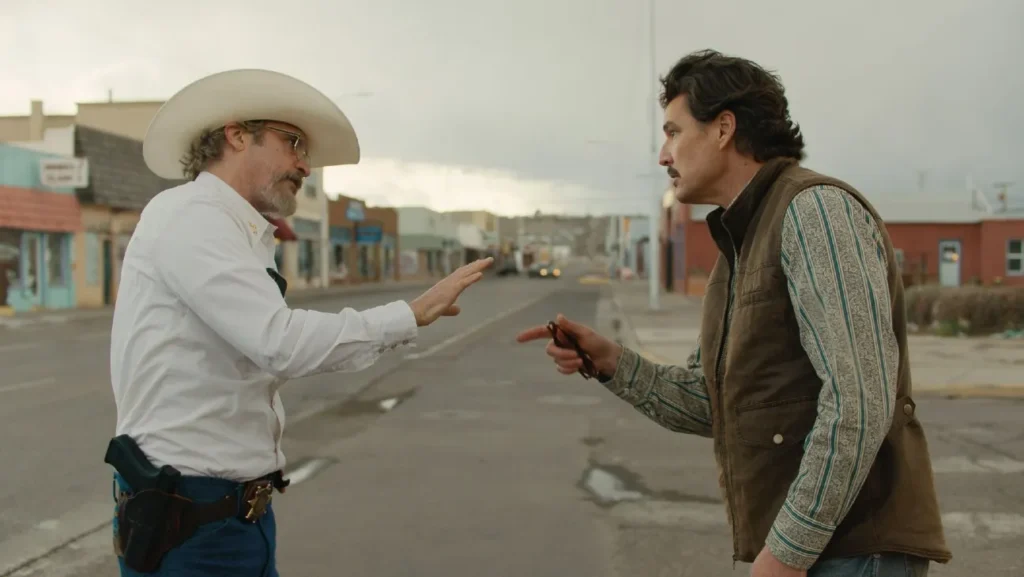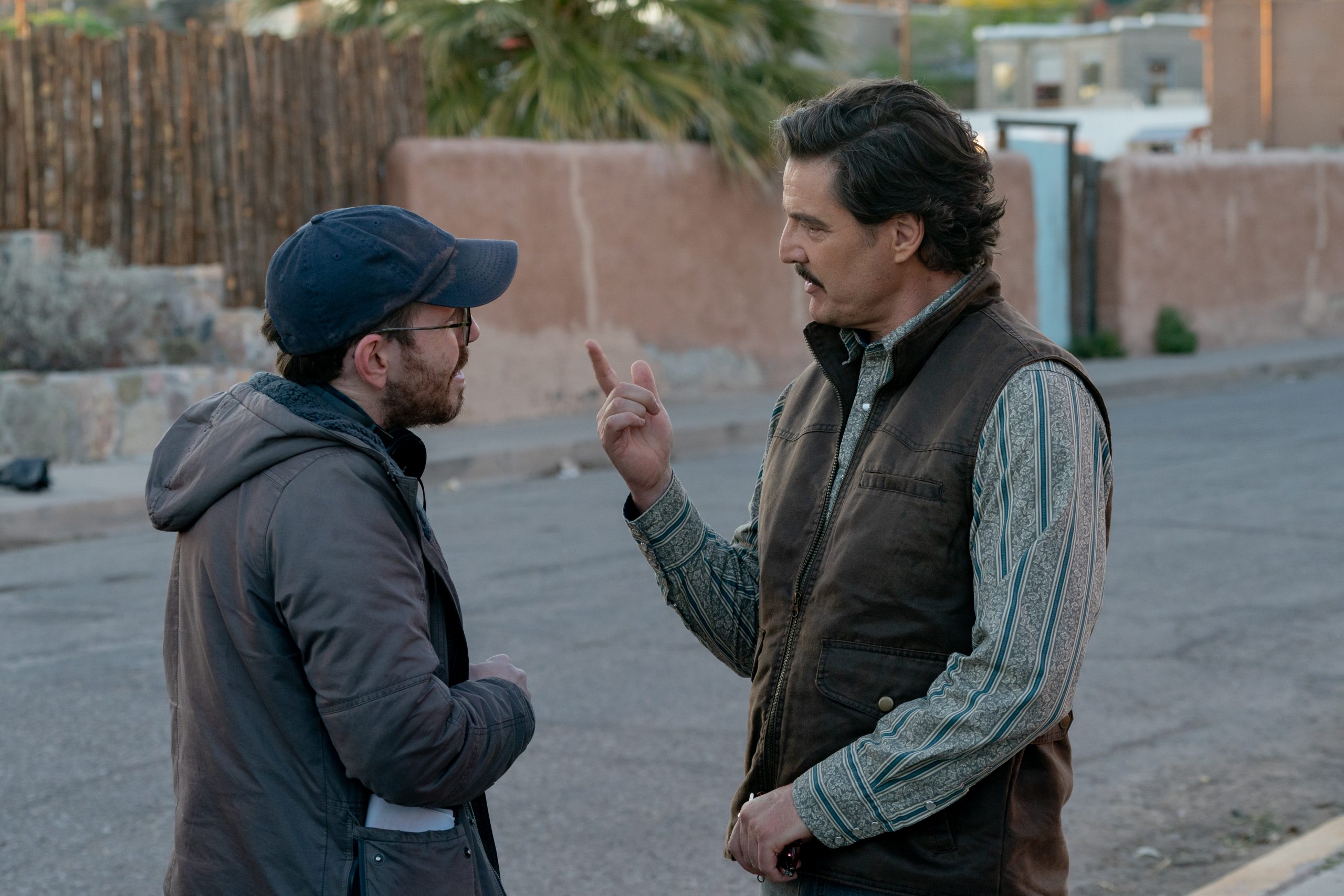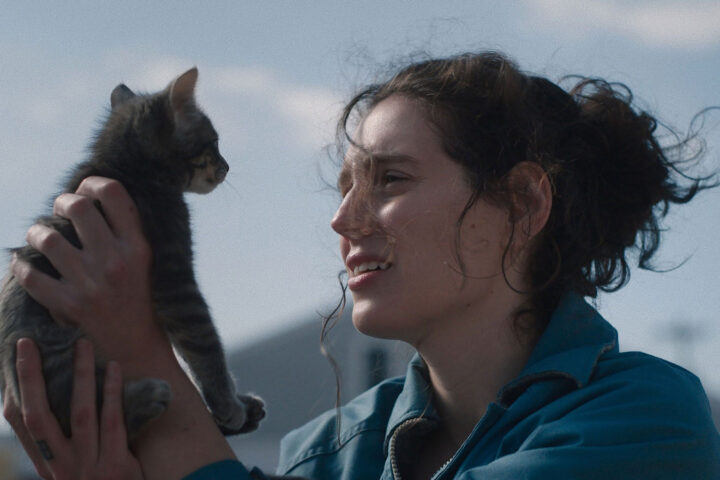Ari Aster’s Eddington is unlike anything else this year in its sprawling attempt to reckon with the fractured state of American life in 2020. Set in a fictional town in New Mexico, the film follows a slow-burning conflict between a conservative sheriff (Joaquin Phoenix) and a progressive mayor (Pedro Pascal), but where it goes is less political drama than portrait of collective cultural breakdown. At once a modern Western, surreal satire, action thriller and social critique, Eddington resists easy categorization—and in doing so gets somewhere much more revealing.
I caught up with Aster (Hereditary, Midsommar) recently at the Peninsula Chicago, where our conversation touched on the collapse of shared truth, theatricality of the COVID era and the picture’s small town microcosm of American anxieties. It was a wide-ranging chat with a filmmaker deeply attuned to the noise, confusion and dread of the present moment.
ChicagoFilm: I found Eddington exciting—few movies feel this relevant. We don’t see many stories about American life today, especially socio-political life. That used to be different—films in the ’70s tackled post-Watergate anxieties, Vietnam, etc. Eddington reminded me of such observations. It also felt like a modern Western with some satire and thriller elements—it’s not really about politics, but about the breakdown of collective culture.
Ari Aster: Yeah. I’ve heard the film be described as apolitical, and that might be right, but I think it’s almost more omni-political. It’s trying to get as many possible voices in the cacophony into the landscape of the film. And I wanted to make a film that was about the environment of America in 2020 specifically; I don’t think we’ve metabolized what happened during lockdown. And I think that’s because we’re still kind of living through it and in the consequences of it. And I don’t think that was the beginning of anything. I think that was an inflection point. I think we’ve been living in this space for a long, long time, but that was the moment at which the link to whatever that old world was, was cut permanently.
CF: You mean because COVID turned into a political football and everyone kind of just went their own way or chose a “side”?
AA: Well, I think it’s because we’ve all been living on the internet ever since we were able to carry it on our person. And I think that started to really change everything and change us. And I think that lockdown made it so that our lives outside were put on hold for a very long time. And we had nowhere to go but the internet. And I think we all feel that something is wrong. I think the dominant feeling in the world right now is one of dread. And I wrote this film in a state of dread; I live in a state of dread now. And I wanted to make a film about a bunch of people who care about the world and know that something is wrong, but they’re all looking through different distorted windows, and they see something that is different, and wrong. So it’s a bunch of people living in different realities.
CF: None of which may be “right” or “wrong.” Who’s to say?
AA: Who’s to say? Most people who go into a film will align themselves with one person over another. I’ve maybe made it a little bit harder to align yourself with anybody in this film.
CF: When you have great actors that are all empathetic it’s hard to align with one over the other.
AA: I wanted to make a film that was empathetic; that I feel like I know these people at this point. It was important to me to not condescend to any of them. But it’s just empathetic in many different directions.
Joaquin Phoenix is superb as Eddington’s troubled Sheriff Joe Cross, who will go through a series of crises politically, professionally and personally. It’s quite a fall he takes, and it left me wondering—was he always broken, or was he broken by this moment?
LS: Well, I see Joe as a very, very sentimental man, which is another way of saying that he’s not really looking at his own life. He’s gripped by the romance of all these ideas he has about America, about his town and about himself. Most of the people in this film are kind of media literate, which is another way of saying this is a western that exists in a world where westerns exist—Joe would have seen those westerns. His stance is informed by those films.
CF: And his idea of himself.
AA: Yeah, absolutely. I think he’s somebody who probably watched a lot of action movies. He’s 50 years old. The action movies of the 80s and the 90s probably would have meant a lot to him. And at the end he gets to live in an action movie. He’s shooting at phantoms. But then you also have a kid in his late teens who would be informed by video games. So it’s a movie about a bunch of people who are almost paralyzed by a sort of self-awareness.
CF: Since you brought it up, late in the movie a sort of paramilitary group emerges. I’m not asking you for an explanation, but was it intended as something that grew out of an undefined, grassroots movement turned fringe militia? I didn’t really know how to brand it.
AA: Well, it’s… whoever you think they are, you’re right. You know, it’s designed as a…
CF: A Rorschach test.
AA: It’s designed to function as a Rorschach test, and I would say, you know, one way that you could… I would say it’s a litmus test. Maybe the best way to describe the moment when you first see the jet is that it is where the movie either announces itself as a satire or as a dramatization of what was really happening—depending on what sphere you’re living in. My answer is buried in there, you know?
CF: At one point, Antifa is referenced.
AA: Yeah, Joe blames something on Antifa, and suddenly that provokes, to use a familiar term, a storm that’s coming.

CF: I found Joe Cross a great tragic character; Phoenix is so good here in your second collaboration following Beau is Afraid. There’s a moment in the movie where he goes to his half-assed campaign rally and makes a false proclamation, setting himself up for a big fall. Phoenix plays him with so much pathos that we can’t help but feel for the guy. He’s also a conservative character, right?
AA: Yeah, well, he’s sort of conservative, he’s sort of libertarian, but yeah, he tips more towards the right wing. I would say we meet him at a point at which he’s suddenly really gripped by a certain theatricality in the moment, and I think there was something weirdly theatrical about COVID and the messaging of COVID—you know, “Stand here, say this…”
CF: Really, we all started performing against people who weren’t—or were—wearing masks.
AA: Yeah, depending on what your stance was. I’m a hypochondriac, so I was wearing masks all the time, but I almost wanted to turn the town into this weird little theater space. I think in the beginning he’s struck by this vision of the way that things are and he says “No, I don’t want to play along. I don’t want to do this.” But then what does he do? He immediately turns on his phone and puts a video into the- he immediately reenters that same system, performing a sort of rebellion. But he can’t, so he’s right back in.
CF: One of the most compelling aspects of the film is how you portray this small town as almost hermetically sealed—yet it can’t keep the outside world at bay. Events like the George Floyd protests, the rise of Black Lives Matter, and generational tensions all break through. It’s not just about COVID; it’s about how national trauma invades even the most insular communities. Were you interested in exploring how “Small Town America” can no longer isolate itself from broader cultural and political upheaval?
AA: Well, thank you. I would just say yes, and it’s also important to bear in mind that this is a small town in New Mexico. New Mexico has a very small Black population. These small towns tend to have, you know, like very few; maybe none. Joe says “It’s not a here problem.” Which is another way (of him saying) that it is an abstraction for these people, but they still take it on because it’s gone viral. And my feeling about the BLM movement was that it took on amazing momentum and it was amazing to see the power and thrust of that thing, but also amazing how quickly it was co-opted by different people who were coming to it for different reasons. Some were really gripped by a real conviction about what was happening and others were maybe more cynical about it. So this is a film that’s about that. I was trying to pull back as far as I could, and give as broad a picture of the environment, while trying to tell a coherent story that is about the incoherent miasma.
This interview has been edited for length and clarity.



